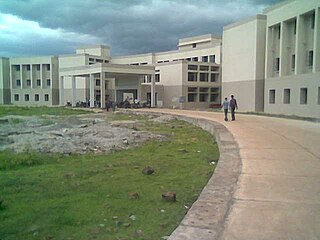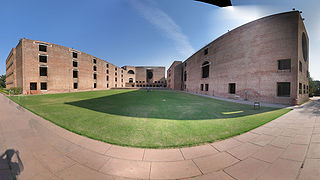
Vocational education is education that prepares people for a skilled craft. Vocational education can also be seen as that type of education given to an individual to prepare that individual to be gainfully employed or self employed with requisite skill. Vocational education is known by a variety of names, depending on the country concerned, including career and technical education, or acronyms such as TVET and TAFE.
A Bachelor of Education is an undergraduate academic degree which prepares students for work as a teacher in schools. A Bachelor of Education program typically lasts three to four years and combines both coursework and practical experience in educational settings. The curriculum is designed to provide foundational knowledge in pedagogy, educational psychology, teaching methodologies, and subject-specific training. Graduates of this program are equipped with the skills necessary to foster a supportive and effective learning environment for their students.
Higher education in Mauritius includes colleges, universities and other technical institutions. Public university education has been free to students since 2019. The sector is managed by the Higher Education Commission (HEC) which has the responsibility for allocating public funds, and fostering, planning and coordinating the development of post-secondary education and training. Formerly the Tertiary Education Commission, in 2020 it was reformed into the HEC and a separate Quality Assurance Authority (QAA) for auditing of qualifications.

University Grants Commission is a statutory body under Department of Higher Education, Ministry of Education, Government of India. It was set up in accordance to the UGC Act 1956 and is charged with coordination, determination and maintenance of standards of higher education in India. It provides recognition to universities in India, and disbursements of funds to such recognized universities and colleges. The UGC headquarters are in New Delhi, and it has six regional centres in Pune, Bhopal, Kolkata, Hyderabad, Guwahati and Bangalore. A proposal to replace it with another new regulatory body called HECI is under consideration by the Government of India. The UGC provides doctoral scholarships to all those who clear JRF in the National Eligibility Test. On an average, each year ₹725 crore (US$87 million) is spent on doctoral and post-doctoral fellowships by the commission.

The All India Council for Technical Education (AICTE) is a statutory body, and a national-level council for technical education, under the Department of Higher Education. Established in November 1945 first as an advisory body, which was given statutory status by an Act of Parliament in 1987, the AICTE is responsible for proper planning and coordinated development of the technical education and management education system in India.

Vidya Academy of Science and Technology (VAST) is a private self-financing engineering college in Thrissur District in Kerala. The college offers a degree in Bachelor of Technology and courses in six branches of engineering - Artificial Intelligence and Machine Learning, Civil, Computer Science, Electrical and Electronics, Electronics and Communication, Mechanical Engineering. The college also offers a degree in Masters in Computer Application (MCA). From the year 2011, the college has offered four MTech courses and two PhD programmes in Electrical Engineering & Computer Science and Engineering. The college was established and is administered by Vidya International Charitable Trust (VICT), a body formed by more than a thousand non-resident Keralites, mostly based in the Arab States of the Persian Gulf.
During the second five-year plan (1956–60) in India, a number of industrial projects were contemplated. To ensure enough supply of trained personnel to meet the demand for these projects, a decision was taken to start the Regional Engineering Colleges (RECs), at the rate of one per each major state, which can churn out graduates with good engineering merit. Thus, seventeen RECs were established from 1959 onwards in each of the major states. Each college was a joint and cooperative enterprise of the central government and the concerned state government. Today, all these institutes now offer degree courses at various bachelors, masters and doctorate levels in various branches of engineering and technology. The entire non-recurring expenditure and expenditure for post-graduate courses during the REC times were borne by the central government. As regards in the REC system the entire recurring expenditure on undergraduate courses, the same was shared by the central government and the state government on 50:50 basis. However, after becoming National Institutes of Technology (NITs) the entire funding is managed by the center now. REC system served well but as time passed some state governments showed lack of responsibility to take them in right direction. Following the long-standing demand for more Indian Institutes of Technology (IITs) the then Minister of Human Resource Development Murli Manohar Joshi decided to upgrade the RECs to NITs. In 2003, all RECs were upgraded to NITs and central government took control to run these Institutes.

The Foundation University Islamabad (FUI), is a university located in Islamabad, Pakistan. It is under the administration of Pakistan Armed Forces and has two campuses; Foundation University School of Health Sciences (FUSH) and Foundation University School of Science and Technology (FUSST).

Engineering education is the activity of teaching knowledge and principles to the professional practice of engineering. It includes an initial education, and any advanced education and specializations that follow. Engineering education is typically accompanied by additional postgraduate examinations and supervised training as the requirements for a professional engineering license. The length of education, and training to qualify as a basic professional engineer, is typically five years, with 15–20 years for an engineer who takes responsibility for major projects.
Previously a neglected aspect of the Indian Central government, Education in Odisha is witnessing a rapid transformation. Its capital city, Bhubaneswar, is emerging as a knowledge hub in India with several new public and private universities, including the establishment of an Indian Institute of Technology after five decades of demand.

The Diploma in Engineering, Diploma in Technology, Diploma in Technical Education is a program focused on practical and skills-oriented training in India. It is a technical course that only covers the essentials when ranked with an undergraduate engineering degree. It aims to provide students with industry or job related basic engineering knowledge, scientific skills, computing and analysis, mathematical techniques, a sound knowledge of English to communicate in the field and the ability to apply problem-solving techniques.

A certified teacher is an educator who has earned credentials from an authoritative source, such as a government's regulatory authority, an education department/ministry, a higher education institution, or a private body. This teacher qualification gives a teacher authorization to teach and grade in pre-schools, primary or secondary education in countries, schools, content areas or curricula where authorization is required. While many authorizing entities require student teaching experience before earning teacher certification, routes vary from country to country.
The Schools of Planning and Architecture (SPAs) are centrally funded technical institutes located across India. They are a group of autonomous public institutes of higher education under Ministry of Education, Government of India. They were established with the objectives of providing quality Architecture and physical planning education. The SPAs primarily offer undergraduate, postgraduate, doctoral and executive education programmes.

Bhadrak Institute of Engineering & Technology formerly Barapada School of Engnineering and Technology (BSET) was founded in 1957. Harekrushna Mahatab, former Chief Minister of Odisha, India conceived the idea with the objective of developing it in due course to a rural university.

Gujarat is a state situated in the western part of India and shares its northwestern boundary with Pakistan. Rajasthan, Madhya Pradesh and Maharashtra are the neighboring states of Gujarat. Gandhinagar is the capital city of the state and Ahmedabad is its largest city and the main commercial hub of the region. Gujarat houses a wide variety of industries and is considered one among the best industrialized states of the nation. Gujarat is also home to some of the prestigious educational institutes of the nation.

The Rehabilitation Council of India (RCI) is the apex government body, set up under an Act of Parliament, to regulate training programmes and courses targeted at disabled, disadvantaged, and special education requirement communities. It is the only statutory council in India that is required to maintain the Central Rehabilitation Register which mainly documents details of all qualified professionals who operate and deliver training and educational programmes for the targeted communities. In the year 2000, the Rehabilitation Council of India (Amendment) Act, 2000, was introduced and notified consequently by the government of India. The amendment brought definitions and discussions provided within the earlier Rehabilitation Council of India Act, 1992, under the ambit of a larger act, namely, Persons with Disabilities Act, 1995.

National Council for Teacher Education (NCTE) is a statutory body of Indian government set-up under the National Council for Teacher Education Act, 1993 in 1995 to formally oversee standards, procedures and processes in the Indian education system. This council functions for the central as well as state governments on all matter with regard to the Teacher Education and its secretariat is located in the Department of Teacher Education and National Council of Educational Research and Training (NCERT). Despite the successful functioning in terms of educational field, it is facing difficulties in ensuring the maintenance of the standards of teacher education and preventing the increase in the number of substandard teacher education institutions in the country.
Thapar Polytechnic College is a polytechnic college in Punjab, India. It is Bhadson Road, Patiala on the Thapar Institute of Engineering and Technology campus. It offers diplomas in five streams. Electrical Engineering, Mechanical Engineering, Architecture, Computer Science and Engineering, Civil Engineering, It is affiliated to PSBTE & IT Chandigarh. There is no entrance exam and admissions are given on the basis of merit of 10th standard. Minimum percentage criteria is 60%. This college is 95% government aided by Department of Technical Education Government of Punjab and received world bank funding through Technical Education Quality Improvement Prog.

India has the largest numbers of engineers as well as the largest number of engineering education institutes and infrastructure in the world. As of 2021, India annually produces 1.5 million engineering graduates. India's technical education infrastructure includes 2500 engineering colleges, 1400 polytechnics and 200 schools of planning and architecture.

Raipur Government Polytechnic, is a government polytechnic located in Raipur, Bankura, West Bengal, India.













